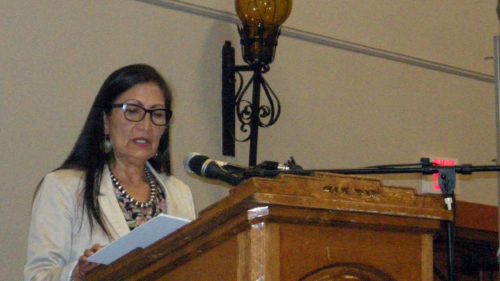SANTA FE — A proposal to take money from the New Mexico Game Protection Fund to fund state parks continues to advance through the 2019 Legislature despite warnings from the New Mexico Wildlife Federation and other groups that enacting it could cost the state game department millions in federal matching funds.
The House Appropriations and Finance Committee on Friday voted to recommend approval of a budget for the state Energy, Minerals and Natural Resources Department that includes a $500,000 transfer from the game protection fund. The committee specified that legislative analysts will continue to study the issue with lawmakers.
Jesse Deubel, executive director of the New Mexico Wildlife Federation, testified to the committee on Friday that the federation was instrumental in creating the game protection fund decades ago. The fund receives money from hunting and fishing license sales and also receives federal matching funds on the condition that the money must be used for conservation.
Deubel warned that transferring money from the game protection fund creates the risk that the U.S. Fish and Wildlife Service will deem the state game department ineligible to receive federal funds. He said the federal agency could call for the state game department to refund federal matching funds.
“The reality is that if that money were to be diverted, the loss in federal supporting would be about $14 million a year,” Deubel said.
John Crenshaw, president of the New Mexico Wildlife Federation, emphasized to the committee that the federation supports full funding for the State Parks Division. However, he also said taking money from the game protection fund runs the risk of incurring sanctions from the Fish and Wildlife Service.
“That federal aid money doesn’t just come with strings attached, it comes with cables,” Crenshaw said.
U.S. Fish and Wildlife officials have written to the game department repeatedly in recent years stating that similar past proposals to transfer money to state parks or other state agencies would be illegal. Crenshaw said he believes that if not for the current federal government shutdown, the federal agency would speak up to oppose the current legislative proposal.
Dan Roper, public lands coordinator for the New Mexico Chapter of Trout Unlimited, testified that his organization is dedicated to protecting and restoring cold water fisheries and watersheds in the state. He said keeping the funds within the game department would be more valuable to the state than transferring them to state parks.
Andrew Miner, an analyst with the New Mexico Department of Finance and Administration, told the committee that the $500,000 proposed for transfer in this year’s general government appropriations bill would mark the fifth year in a row that amount of money would be transferred from the game protection fund for hunting, fishing and other wildlife activities on state park properties.
Miner told the committee that the New Mexico Department of Game and Fish believes that Fish and Wildlife Service could view such transfers as a diversion that could cause a loss of federal funding.
“I believe the the reason why it’s kind of coming up more this year than in previous years — as I said, this has been in the budget before — is that they have an upcoming federal audit and they believe that it might draw some special attention under the audit,” Miner said of the game department.
Anne Hanika-Ortiz, a contract analyst with the Legislative Finance Committee, told the committee that her office regards the transfers from game and fish to state parks as essentially payments for services rendered. She said state parks do all sorts of wildlife-related conservation activities.
Sarah Cottrell Propst, secretary of the New Mexico Department of Energy, Minerals and Natural Resources, told the committee that 27 state parks allow hunting, fishing or both. She said four state parks are on land owned by the state game department.
“If this money wasn’t coming to us, we would functionally be managing those parks on game and fish land for free,” Propst said.
Rep. Paul Bandy, R-Aztec, said that if state parks use the money for the purpose for which it’s intended, “It seems like to me that would be a legitimate use,” he said.
Rep. Nathan Small, D-Las Cruces, said it doesn’t appear that the current practice of taking money from game and fish and putting it in a fund for general parks operations would necessarily pass a federal audit.
“It seems that it would make a lot more sense to go back and work with game and fish to identify specific projects,” Small said.



